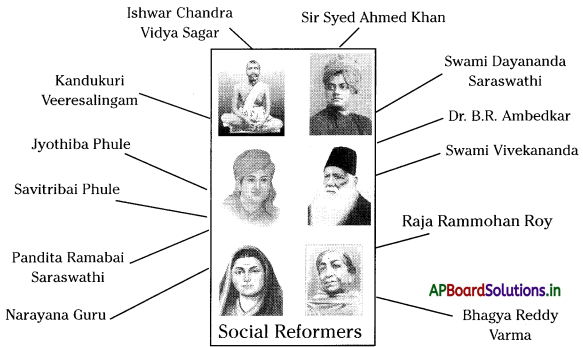Students can go through AP State Board 8th Class Social Studies Notes Chapter 19 Social and Religious Reform Movements to understand and remember the concept easily.
AP State Board Syllabus 8th Class Social Studies Notes Chapter 19 Social and Religious Reform Movements
→ Many Christian missionaries came to India along with the European companies to preach Christianity in India.
→ The Europeans introduced the printing press in India.
→ In 1828 Rammohan Roy founded the Brahmo Samaj.
→ Swami Vivekananda was a disciple of Ramakrishna and he set up the Ramakrishna Mission.
→ Swami Dayananda Saraswathi set up Arya Samaj in 1875.
→ The suppression of the revolt of 1857 had created a lot of bitterness between Muslims and the British.
→ Sir Syed Ahmed Khan started the Aligarh Movement for the spread of modern education and social reforms among Muslims.
![]()
→ Kandukuri Veeresalingam was a social reformer of the Andhra Region.
→ Savitribai Phule along with her husband Jyothiba Phule played an important role in improving women’s rights in Maharashtra.
→ Ramabai devoted her life to helping women, especially widows.
→ Jyothiba Phule founded Satya Shodhak Samaj to build a new society based on truth and equality.
→ Narayana Guru was a religious leader who preached the idea of “One Jathi, One God and One Religion for all”.
→ Some of the reformers called Dalits of Andhra Pradesh ‘Adi Andhras’.
→ Gandhiji encouraged women to participate in the Non-Cooperation Movement and Satyagrahas.
→ Ambedkar founded an Independent Labour Party to represent the interests of the Dalits.
→ Reforms: A change in any pattern.
→ Sati: In some parts of the country, upper-caste women were burnt along with the bodies of their dead husbands. This was called ‘Sati’.
![]()
→ Purdah: There ¡s a system for women covering their faces with some clothes or sarees. This is known as the Purdah system.
→ Widow marriages: In the olden days the widows were suffered a lot in their families. So some reformists worked on this and introduced remarriages to them.
→ Untouchability: It was a sin in society. Some castes in the society were treated as lower castes. And the higher caste people wouldn’t touch them. These were called untouchability.
